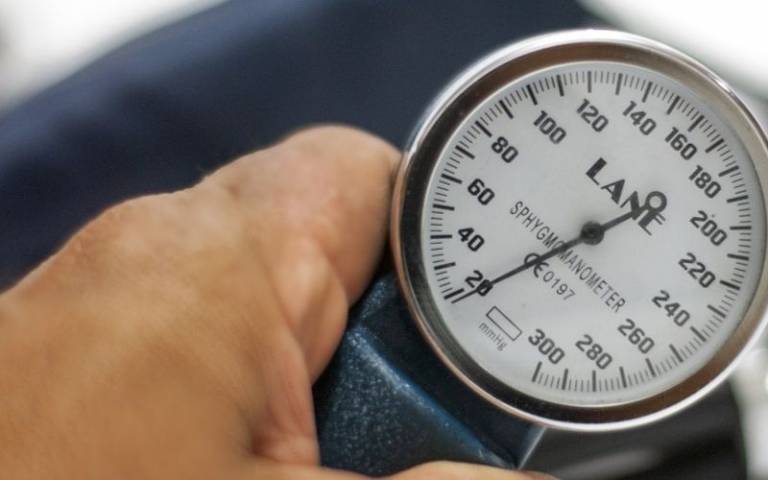High blood pressure is down, but lifestyles are still unhealthy
4 December 2018
The number of adults with untreated high blood pressure has decreased for both men (20% to 12%) and women (16% to 11%), according to a new report co-authored by UCL and NatCen Social Research.

The research was commissioned by NHS Digital as part of the Health Survey for England which monitors trends in the nation’s health on a variety of topics including mental and physical health and their risk factors by tracking nearly 8000 adults and 2000 children since 1991
Authors from UCL involved in the report were Dr Shaun Scholes, Dr Linda Ng Fat, and Professor Jenny Mindell (all UCL Institute of Epidemiology & Health Care). The UCL team were involved in analysing data on cardiovascular disease and various aspects of adults’ health including multiple risk factors.
Adult multiple risk factors
New analysis shows the prevalence of unhealthy lifestyle behaviours in adults and the number of those with more than one risk factor to their health. A multiple risk score is calculated by combining information on whether individuals:
- Smoke cigarettes
- Drink more than 14 units of alcohol a week
- Eat fewer than 5 portions of fruit and vegetables a day
- Are obese
- Have low physical activity
13% of adults had no risk factors, and 36% had only one risk. 32% of adults had a combination of two risks and 19% had three or more.
“People may not realise that these risk factors don’t just add to your risk, they can multiply your risk of developing heart disease, stroke, or cancers”, said Professor Jenny Mindell (UCL Epidemiology & Health Care).
”Stopping smoking, eating more vegetables or fruit, being more active, cutting down on alcohol, and being a healthy weight also reduces your risk of dying even if you have already had a heart attack or a stroke.”
Adults in the lowest income households (26%) were twice as likely as those in highest income households (13%) to have three or more ‘lifestyle’ risk factors, with men more likely (54%) than women (47%) to have two or more risk factors.
Regionally, the West Midlands (58%) had the highest proportion of adults with two or more risk factors while London had the lowest (43%).
Diabetes
The proportion of adults reporting doctor-diagnosed diabetes increased between 1994 and 2017, with some year-on-year fluctuation, from 3% to 8% among men and from 2% to 5% among women. The increase has been largest for those aged 65 to 74, increasing from 5% in 1994 to 15% in 2017.
The survey also measured diabetes in a second way, by whether glycated haemoglobin (HbA1c) levels in blood samples collected at the nurse visit were raised or not. The combination of measures indicated that 20% of adults with diabetes were undiagnosed.
Hypertension (persistent high blood pressure)
The prevalance of hypertension has fallen since 2014 from 32% to 28% among men but has remained relatively stable among women (from 27% to 25% across the period). Unlike most health measures, hypertension prevalence differed neither by region, nor by household income.
In 2017, 67% of adults aged 45 and over on treatment for hypertension had their hypertension controlled (to below 140/90mmHg). This proportion declined with age from 71% among those aged 45 to 64 to 60% among those aged 75 and over.
Cardiovascular disease
In 2017, 14% of adults aged 16 and over, 15% of men and 13% of women, reported ever having any doctor-diagnosed cardiovascular disease (CVD). This was at a very similar level in 2011 (14% of men and 13% of women).More men than women suffered from ischaemic heart disease (6% and 3% respectively) and from stroke (3% and 2% respectively).
CVD was more prevalent in lower income households. 22% of adults aged 35 and over in the lowest income quintile and 16% in the highest income quintile reported any CVD. Prevalence of reporting both doctor-diagnosed ischaemic heart disease and stroke has not changed since they were last asked about in 2011.
Links
- Professor Jenny Mindell's academic profile
- UCL Institute for Epidemiology and Health
- NatCen Social Research
Image
Credit: Pixabay
Media contact
Rowan Walker
Tel: +44 (0)20 3108 8515
Email: rowan.walker [at] ucl.ac.uk
 Close
Close

